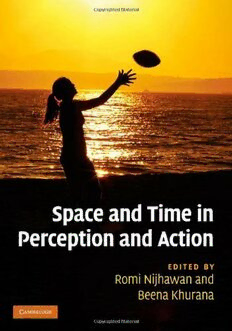
Space and Time in Perception and Action PDF
582 Pages·2010·4.395 MB·English
Most books are stored in the elastic cloud where traffic is expensive. For this reason, we have a limit on daily download.
Preview Space and Time in Perception and Action
Description:
What is the instantaneous position of a moving object from the point of view of the observer? How does a tennis player know when and where to place their racket in order to return a 120 mph serve? Does time stop sometimes and go faster at others? Space, time and motion have played a fundamental role in extending the foundations of 19th and 20th century physics. Key breakthroughs resulted from scientists who focused not just on measurements based on rulers and clocks, but also on the role of the observer. Research targeted on the observer's capabilities and limitations raises a promising new approach that is likely to forward our understanding of neuroscience and psychophysics. Space and Time in Perception and Action brings together theory and empirical findings from world-class experts and is written for advanced students and neuroscientists with a particular interest in the psychophysics of space, time and motion.
See more
The list of books you might like
Most books are stored in the elastic cloud where traffic is expensive. For this reason, we have a limit on daily download.
